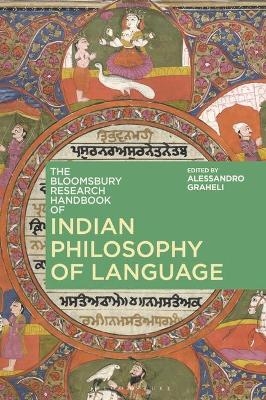
The Bloomsbury Research Handbook of Indian Philosophy of Language
Bloomsbury Academic (Verlag)
978-1-350-04916-1 (ISBN)
Complete with further reading suggestions and an annotated bibliography, this collection makes an important contribution to both Eastern and Western contemporary philosophy of language.
Alessandro Graheli is principal investigator of the FWF project “The Meaning of the Sentence in Indian Philosophy” at the Institute for the Cultural and Intellectual History of Asia, Austrian Academy of Science, Austria, and Assistant at the Department of South Asian, Tibetan, and Buddhist Studies, University of Vienna, Austria.
Introduction
Part I. Of Speech Units: Phonemes, Words, and Sentences
Introduction
1. Linguistic Segmentation in Early Vyakarana, Maria Piera Candotti
2. From Permanent Phonemes to Words, Monika Nowakowska
3. Ontology and Epistemology of Speech in Nyaya, Alessandro Graheli
4. The theory of the Sphota, Akane Saito
5. A Buddhist Refutation of Sphota, Sara McClintock
6. The Place of Language in the Philosophy of the Recognition, Marco Ferrante
Part II. Of Word Meanings
Introduction
7. Early Nyaya on the Meaning of Common Nouns, Matthew R. Dasti
8. Dignaga on Relation, Kei Kataoka
9. Meanings of Words and Sentences in Mimamsa, Elisa Freschi
10. Sabdartha as Sense or Reference: Dharmakirti on Synonymy, Patrick McAllister
11. Semantic Relations and Causation of Verbal Knowledge, Alessandro Graheli
12. Human Intellect and God’s Will in Navya Nyaya Semantics, Yoichi Iwasaki
Part III. Of Sentence Meanings
Introduction
13. Salikanatha’s Introduction to his Fundamentals of Sentence Meaning, Andrew Ollett
14. Salikanatha on Language Acquisition, Kei Kataoka
15. The Deontic Nature of Language in Mimamsa and Vedanta Schools, Elisa Freschi
16. Speaking of the individual: Prakasatman’s akhandarthavada and the beginnings of a theory of language in classical Advaita-Vedanta, Hugo David
17. The Role of Intention in Gangesa’s Non-Communicational Model of Verbal Understanding, Yoichi Iwasaki
Part IV. Of Implicatures
Introduction
18. Kumarila on the Role of Implicature in Sentence-Signification, Lawrence McCrea
19. The Intentionality of Words: Jayanta’s Syncretism of Nyaya and Mimamsa, Alessandro Graheli
20. Rasa as Sentence Meaning, Andrew Ollett
21. Meaning beyond Words: The Implicature Wars, Daniele Cuneo
Chronology
Glossary
Annotated Bibliography of Indian Philosophy of Language
Index
| Erscheinungsdatum | 24.02.2020 |
|---|---|
| Reihe/Serie | Bloomsbury Research Handbooks in Asian Philosophy |
| Verlagsort | London |
| Sprache | englisch |
| Maße | 156 x 234 mm |
| Gewicht | 853 g |
| Themenwelt | Geisteswissenschaften ► Philosophie ► Östliche Philosophie |
| Geisteswissenschaften ► Religion / Theologie | |
| ISBN-10 | 1-350-04916-6 / 1350049166 |
| ISBN-13 | 978-1-350-04916-1 / 9781350049161 |
| Zustand | Neuware |
| Haben Sie eine Frage zum Produkt? |
aus dem Bereich


